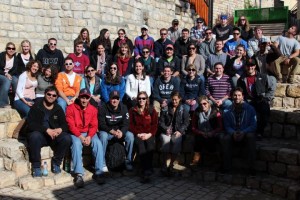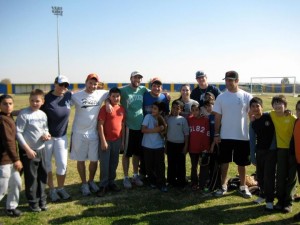By Zev Ben Avigdor/Jewish Baseball News
In January, a group of college students traveled to Israel on a special Birthright Israel trip designed for baseball players and fans. Allison Hellman, a 20-year-old baseball fan and communications major at Cornell University, shared some of her thoughts about the trip with Jewish Baseball News. Her interview is the first in a series by correspondent Zev Ben Avigdor — the nom de plume of a university scholar — that will explore the connections between Jews and baseball.
—————————
What was the Birthright trip like?
Hellman: A life-changing experience. I think that’s the easiest way to put it. I’ve never heard of someone coming back from a Birthright trip and not having an amazing experience, but there were just…it blew me away: the landscapes, the culture, the food. Just what we got to experience in ten days, and how much we got to experience was absolutely incredible, and I cannot wait to go back.

Birthright Israel's baseball trip visits Safed (Photo: Allison Hellman)
What did baseball add to that, and what kinds of baseball things did you do?
When I was signing up for the trip, I was looking into some of the more specialized trips, and I thought I could do something a little different, and I came across this baseball-themed trip, and I didn’t look at anything else. That was exactly what I wanted to do.
I’m a life-long baseball fan, I played softball for years and years, and it just seemed like a really, really great way to experience two things — one thing I’ve always wanted to do, and one thing I’ve always loved — together. It was particularly interesting to me because I have a mother from Brooklyn who grew up as a Mets fan, and (I) still remember hearing about Sandy Koufax playing for the Dodgers and what that meant to her growing up. So I knew it would be a unique experience, something that none of my friends would do when they went on Birthright.
When we got there, the first thing we all had in common was that we signed up for a particular trip. In fact, when we got to the airport and we got to the gate, we were all supposed to sit in a circle and introduce ourselves, (but) a few of us told our trip leader: ‘Can you give us five minutes? There’s two minutes left in the Broncos game and we’d really like to watch it.’ And everybody just went over to the TV to see what was going on. So we sort of immediately bonded over our love for and interest in sports.
And we had a lot of college-level players there, which was nice, because it’s not just fans. It’s guys who are playing, day in and day out, as well. And really there was only one day that was truly baseball themed. When we got to Israel we spoke with (Israel Association of Baseball board member) David Leishman. He told us a bit about the history of the (Association), but we really didn’t do anything baseball-involved until the day we went to Ofakim to teach these kids how to play baseball. (Reporter’s note: Ofakim is a small development town just west of Beer Sheva, in the south of Israel. Originally founded by Jewish immigrants from North Africa, Iran, Romania, and India in the 1950s, Ofakim is an eclectic mix of cultures that now includes families of the original settlers as well as newer immigrants from Ethiopia and the former Soviet Union and a growing ultra-Orthodox community. While Ofakim houses one of Israel’s national tennis centers as well as a soccer stadium, the community has not had a baseball culture. Like a number of small Negev towns, Ofakim has faced economic challenges. In addition, residents of Ofakim live under the threat of rocket fire from the Gaza Strip.)
We played on an old soccer field, because there are no baseball fields. Every morning before that day, the trip leader, David Klein . . . would teach us a couple words in Hebrew to help us teach them: ‘two hands’, ‘like this’, ‘bat, ball, glove’, things like that, ‘run’ and ‘good job.’ We went down there early in the morning and spent a good few hours teaching about 200 fourth- and fifth-graders how to play baseball, and most of them had never seen a baseball in their life. Then later that afternoon we went into Tel Aviv to play a pick-up softball game with some members of the national team. So that was the only day of baseball, but there was something really special about bringing a uniquely American sport to Israel, and not just to Israel, but to a particular part of the country that really doesn’t have as much exposure to American culture.
They loved it right away, and that was something so amazing for us, especially those of us who love baseball with a passion: to see their eyes light up when they catch the ball for the first time or hit it correctly or they beat their friend to first base, that kind of thing. It wasn’t just about teaching, which was an amazing part of it. It was about something American that we could give to them.
What do you think baseball does for Israel, and what does Israel do for baseball?
You know, I think Israel can have a special connection with baseball, because Israel has a very, very deeply rooted history, in so many different ways, and so does baseball. Baseball prides itself on its history, I think, more than any other sport, with records and statistics and stories of old-timers and quotes that never die. Baseball is its history, and I think Israel is very much the same: It’s a modern state that is always about the future of Israel, but it’s based on its past.
And so I think in that way, baseball and Israel can get along very well. I think it’s just a new thing, it’s another way to get on the world stage, as they’re getting ready for the World Baseball Classic. That’s what baseball’s giving them, it’s another chance to show that Israel is a strong country that can compete with the best of them. But more than that, Americans love baseball for a reason. Why shouldn’t Israelis love it for the same thing? It’s just a great sport; it’s a good game.

Allison Hellman (center) and Birthright Israel friends with Israeli kids
Beyond the historical aspect of it, what makes it such a great sport? What do you love about it?
After last night’s game [Super Bowl XLVI], one aspect I particularly love about baseball is that you can’t run out a clock, which is endlessly frustrating to me in every other sport I watch or have played at some point. It just doesn’t seem fair to me, but that’s another story. It’s more cerebral than other sports, I think. You really have to think about what you’re doing. There’s something to me that’s particularly special about baseball, and it’s an oft-quoted aspect of baseball, and it’s sort of cliched, but it’s the fresh-cut grass and the smell of the leather glove and the crack of the bat that are so different than other games.
In football it’s just a constant roar of the stadium, and in basketball it’s just too quick to take in everything, but baseball, it’s something that…you really appreciate every aspect of it. And things are very rare in baseball. There are some really special moments. And there’s something about the fact that even a routine play has the potential to be game altering. You look at last summer — nobody expected that Armando Galarrago would not get that call at first base. It’s a routine play at first base. You pick up the ball, you throw to first base, and that’s it. Ninety-nine times out of a hundred he’s going to be out, but it’s that chance — every time the ball leaves a player’s hand, that something different can happen — that’s really special. In football you throw the ball, it’s pretty likely that you’re not going to complete a pass, because it happens so often, but when you throw to first and something doesn’t happen that should, it’s very different than any other sport.”
So much of what you’ve said are things that baseball players have told me: the feeling of time, the cerebral or mental aspect of the game, dealing with frustration and failure.
There’s something to be said as well that baseball is a summer sport, that spring training is the awakening of the baseball season, and as you get to go enjoy the warm weather you go outside, and you have a cold drink, and you hang out with friends. You don’t really get the same thing when you’re huddled up in jackets in the winter or you have to layer up six times to go to a game. There’s something particularly special about its being a game of summer. It, in a sense, reminds you that it’s still a game, that it’s more than a sport and a league and a money-making machine. The fact that it’s during summer, it’s more relaxed.
And more suited to Israel’s climate.
Yes, that is very true as well. The trip to Israel – you don’t have to be a baseball fan to enjoy that trip. If you enjoy teaching, if you enjoy seeing cultures mix together, if you enjoy sports in general, you will love that moment of baseball in Israel. It was everyone’s favorite part, because there was so much pride we took in bringing an American thing that they could enjoy, and there was so much pride we took in seeing the smiles on their faces when they enjoyed the game and when they succeeded, and you don’t get that on many other Birthright trips. It’s something that baseball and America brought to Israel.
# # #
Buying something on Amazon.com? Show us some love and click through our Amazon link








